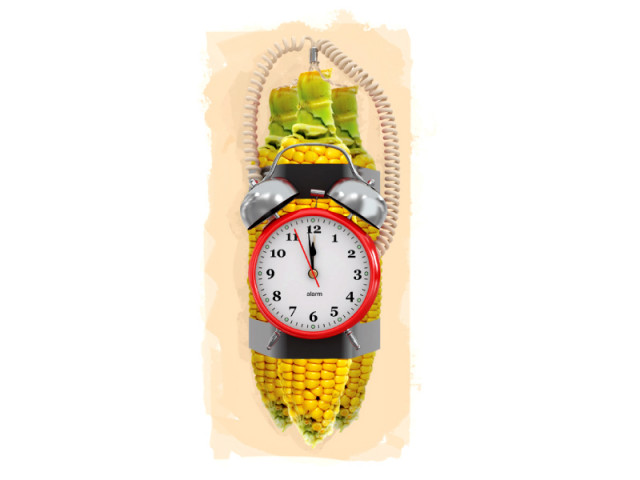A changed man: From martyrdom to roasted corn
Mohammad Rasheed, street vendor, looks back on his life as a jihadi in Afghanistan, a life he has left behind.

According to Rasheed, a devout man, the ongoing insurgency in Pakistan and the Taliban attacks in Afghanistan are not real jihad at all. ILLUSTRATION: JAMAL KHURSHID
Corn on the cob vendor Mohammad Rasheed*, 50, stands along the beach with his pushcart, with the stench of decaying fish in the air.
He is deep in thought, clearly preoccupied with the memories of a not-so-ordinary past.
“In the evening, when the sun dips into the sea, and the people move back inside their homes, I compare my past life with my present life,” he says quietly as he adds more wood to the fire and peels corncobs. “I could have been a good scholar or something else. I dwell on all the possibilities that could’ve been if I had not opted for jihad.”
Yes, Rasheed is not just a roasted corn seller – he is also a former jihadist.
The making of the man
Rasheed hails from Jalalabad and migrated to Pakistan in the early 1980s, right after his father’s death. He fought against the Khalqi’s government, led by Nur Mohammad Taraki, the former president of Afghanistan, when he was studying Islamic Sharia at the Najmul Madaris, a seminary in his hometown.
The move towards jihad was not sudden. According to him, he and his friends would distribute pamphlets against the Khalqi government, as a part of student life. Then, one of his classmates had a fight with the Khalqis in a playground, and the retaliation was intense.
“Sepoys picked us up from our hostel in the middle of the night and kept us in an unknown location for 27 days. We were beaten and tortured with electric shocks,” narrates Rasheed. “They wanted to check if I and the two other boys in their custody had any links with the Afghan-based Ikhwan al-Muslimeen.”
He recalls how he was suddenly released one night and asked to disappear from the area. However, because of the torture that had been inflicted, he couldn’t even stand.
After this experience, Raheed joined the Harakate Inqilabe Islami, with Molvi Mohammad Nabi Mohammadi, as soon as he reached the hostel. The group would attack government installations to create chaos and destabilise the government in Kunar.
“Our goal was to please Allah, the Quran and our law. In this group, jihad was the path to martyrdom and our utmost desire,” he explains.
An altered outlook
Right after his move to Pakistan, Rasheed quit jihad and drastically changed his life. He started off by selling fruits and vegetables in Peshawar, and moved to Karachi in 2000. Today, he sells corn in the winter and juice during the summer.
“Life was difficult during the times I was actively a jihadist,” he says. “Compared to that, this life is good. However, it would’ve been perfect if I had completed my studies. Earning a good living, especially for 11 members of a family, is hard when one is uneducated and unskilled.”
His father’s death also became a catalyst as, all of a sudden, it was he who had to support the family.
Now, in retrospect, he understands the magnitude of the brutality he saw during that time.
“Commanders were killing poor, righteous men, and sparing those – even communists – who gave them a machine gun or any other weapon,” he recalls. “Even those people fighting against the government had morphed into beasts.”
To reiterate this view, Rasheed cites the example of a boy who had joined them in jihad. This young man’s father was a communist.
“We were reluctant to accept him at first, but later allowed him to join. Then, one day, I heard gunshots. I glanced outside to see that our group leader had killed the boy and was drinking his blood to illustrate his hatred against Communists,” he narrates, shaking slightly. “That is the day I quit jihad and returned home. There were many instances such as this of men becoming beasts.”
On terrorism today
According to Rasheed, a devout man, the ongoing insurgency in Pakistan and the Taliban attacks in Afghanistan are not real jihad at all. Today, as a Pashtun nationalist and poet, he feels he has grasped the meaning of holy struggle.
“Attacking mosques and other places of worship, killing innocent beings, is not jihad,” he says categorically. He is also strongly against the recent attack on the church goers in Peshawar, and says that such acts of terrorism are against Islamic teachings.
“You can wage jihad against those who point weapons at you, aiming to kill you,” he states. “But those in the church were simply people working and living with us, they were simply people who were serving the country.”
*Name changed to protect identity
Published in The Express Tribune, October 1st, 2013.

1724319076-0/Untitled-design-(5)1724319076-0-208x130.webp)

















COMMENTS
Comments are moderated and generally will be posted if they are on-topic and not abusive.
For more information, please see our Comments FAQ